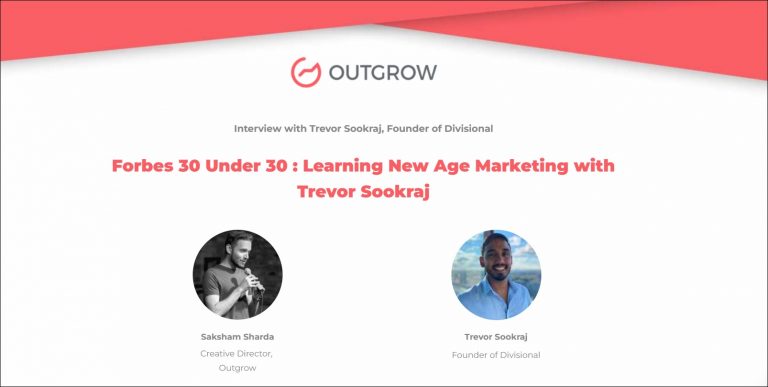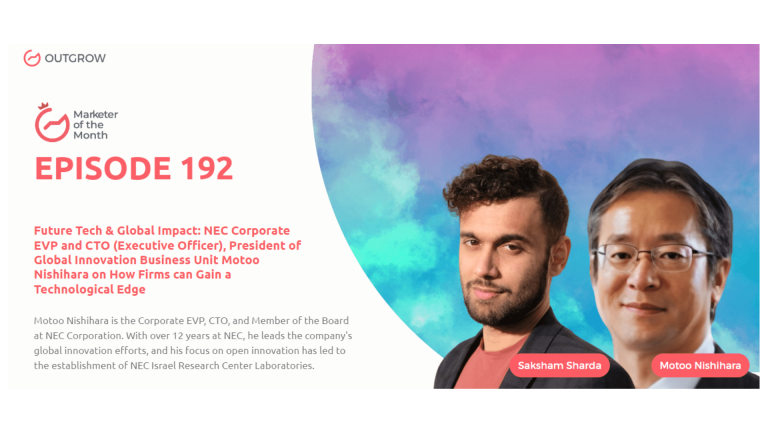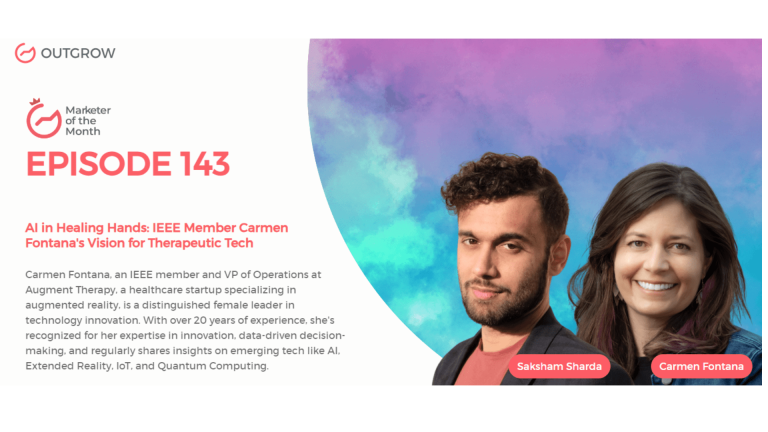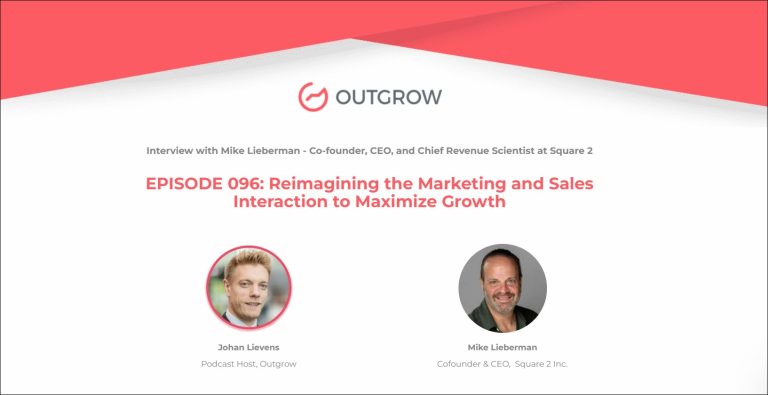Summarize with :
EPISODE 229: Marketer of the Month Podcast with Rolandas Juteika
Table of Contents
Hey there! Welcome to the Marketer Of The Month blog!
We recently interviewed Rolandas Juteika for our monthly podcast – ‘Marketer of the Month’! We had some amazing insightful conversations with Rolandas and here’s what we discussed about-
1. AI’s role in revolutionizing digital investing experiences.
2. Asset tokenization and its future potential in finance.
3. Balancing innovation with regulatory compliance in fintech.
4. Traditional banks vs fintech: adapting to survive.
5. Growing Gen Z interest in ESG investing.
6. Rise of hyper-personalization in digital financial services.
7. Challenges in merging asset classes on a single platform.
About our host:
Dr. Saksham Sharda is the Chief Information Officer at Outgrow.co He specializes in data collection, analysis, filtering, and transfer by means of widgets and applets. Interactive, cultural, and trending widgets designed by him have been featured on TrendHunter, Alibaba, ProductHunt, New York Marketing Association, FactoryBerlin, Digimarcon Silicon Valley, and at The European Affiliate Summit.
About our guest:
Rolandas Juteika is the CEO & Chairman of the Board at Revolut Securities Europe and Head of Wealth and Trading at Revolut. He has led the company’s business strategy, risk management, and compliance, driving its rapid growth in the EEA. He is also a board member of the Lietuvos Finansų Maklerių Asociacija, contributing to financial brokerage governance in Lithuania.
Trading Places: Revolut’s CEO Rolandas Juteika on how to Market the Future of Wealth
The Intro!
Saksham Sharda: Hi, everyone. Welcome to another episode of Outgrow’s Marketer of the Month. I’m your host, Dr. Saksham Sharda, and I’m the creative director at Outgrow. co. And for this month we are going to interview Rolandas Juteika, who is the CEO & Chairman of Revolut Securities Europe.
Rolandas Juteika: Great to be here. Thank you.
Don’t have time to read? No problem, just watch the Podcast!
Challenge yourself with this trivia about the exciting topics Rolandas Juteika covered in the podcast.
Or you can just listen to it on Spotify!
The Rapid Fire Round!
Saksham Sharda: Alright, so let’s start with the rapid fire rounds to break the ice. The first question is, at what age do you want to retire?
Rolandas Juteika: At 40.
Saksham Sharda: How long does it take you to get ready in the mornings?
Rolandas Juteika: 10 minutes.
Saksham Sharda: Favorite color?
Rolandas Juteika: Red.
Saksham Sharda: What time of day are you most inspired?
Rolandas Juteika: In the morning.
Saksham Sharda: How many hours of sleep can you survive on?
Rolandas Juteika: Four.
Saksham Sharda: The city in which the best kiss of your life happened?
Rolandas Juteika: Barcelona.
Saksham Sharda: Pick one. Sam Altman or Mark Zuckerberg?
Rolandas Juteika: Sam Altman.
Saksham Sharda: How do you relax?
Rolandas Juteika: Programming.
Saksham Sharda: How many cups of coffee do you drink per day?
Rolandas Juteika: Three, four.
Saksham Sharda: The most valuable skill you’ve learned in life.
Rolandas Juteika: Never stop learning.
Saksham Sharda: Morning routine. Are you an early riser or a night owl?
Rolandas Juteika: Early riser.
Saksham Sharda: One-word description of your leadership style?
Rolandas Juteika: Empowerment.
Saksham Sharda: Coffee or tea to kickstart your day?
Rolandas Juteika: Coffee.
Saksham Sharda: Top priority in your daily schedule?
Rolandas Juteika: Start with the most complex tasks.
Saksham Sharda: Ideal vacation spot for relaxation?
Rolandas Juteika: Any place where there is calm and the weather is hot.
Saksham Sharda: A key factor for maintaining a work-life balance?
Rolandas Juteika: Trying to finalize the tasks, still, the time you have in your mind.
Saksham Sharda: What is one skill that the next generation needs to learn?
Rolandas Juteika: Usage of AI and dealing with different citations.
The Big Questions!
Saksham Sharda: Alright, so that was the end of the rapid fire. Now we’re gonna go on to the longer questions, and you can answer as much time and ease as you’d like. As the CEO of Revolut Securities Europe, how do you see the future of digital investing evolving in the next five years?
Rolandas Juteika: This is a very interesting topic, especially these days when the AI topic is very broad and very interesting. So I’m particularly interested in the two topics. So the first topic is, of course, the usage of artificial intelligence itself. And the second topic is asset tokenization. So I think we still probably don’t imagine what AI could bring to us in the next five years. And it could be really huge. So now let’s say if we talk about trading and investing, we do it usually in our hands, you know, hands in our mobile apps. But I think what AI could bring is that trading could happen on behalf of the user by some AI assistant, which would know you, which would learn your habits, and would do everything on your behalf. And as I mentioned, another interesting part is assets organization where, you know, this could evolve as a separate product group where users would be able like to get even better prices, better costs, and more liquidity, and also like instant execution, which is very interesting.
Saksham Sharda: How do you balance regulatory compliance with the fast-paced nature of all this fintech innovation?
Rolandas Juteika: Yeah, it’s very sometimes hard to do that because, you know, you have a set of rules under which you need to comply. So you want to innovate, you want to create new products, but there are certain limitations coming from regulations. So in this part, it’s very important to constantly talk with regulators, to constantly share ideas, share how the future evolves how and what investors demand. And basically, it’s a collaboration between regulators and businesses to make the future of investing better.
Saksham Sharda: What is the Future of All-in-One Investment Platforms? Are Investors Ready for a Unified Experience?
Rolandas Juteika: So they are not even ready, they are demanding it. So the platform that has access to many financial services in one place has a huge advantage compared to such that offers only one solution. So it’s much more convenient for users, like to find everything in one place, what they want, the different services in one app rather than browsing and switching from one app to another. So in this case, yeah, users really like to have everything in one place.
Saksham Sharda: What are the biggest challenges in integrating multiple asset classes into a single platform?
Rolandas Juteika: Yeah, so the biggest challenge is user experience and itself user interface. So if you have many products, many features to propose, you need to find a balance of basically what the type of user is and which product fits best for them. So I think the next big topic will be personalization, and artificial intelligence will help to understand what type of user, what he likes, what he dislikes, what products he needs, basically. And personalization is the next big thing that is coming, which will allow the user not to lose their head between many different products and offerings, and services.
Saksham Sharda: With the rise of commission-free trading, how does Revolut Securities differentiate itself in a crowded market?
Rolandas Juteika: One of the advantages that we have is, of course, that in our app, many different and very, you know, contrasting financial services are available. So we are not just a trading app, we are a financial super app where users can make payments, they can pay their bills, they can use cards, they can use Revolut abroad, they can book hotels, they can buy eSIMs and gigabytes in other countries. So this makes Revolut very convenient in general as a super app, like to have many services, many offerings in one place, and trading is just part of it.
Saksham Sharda: So does that not make it confusing for the user, the more features you keep adding, or is there some way you can get around that?
Rolandas Juteika: Yeah, that’s what I mentioned about personalization. So, this is very important to understand what the user is, what he wants, and what he needs. So this is the thing that we’re working on to make the app and all the services more personalized so that you open the app and the app basically understands your needs, so you can find the products that you want in the most efficient way.
Saksham Sharda: So, Revolut has been instrumental in the way digital banking and investment platforms have transformed personal finance. How do you see the role of traditional banks changing in response to banks like Revolut?
Rolandas Juteika: Yeah, that’s a very good question. So, traditional banks are sitting on old core systems, which are very costly and hard to change. But you know, they are so big institutions that they will still survive, like really for for upcoming future. So, I see what they are doing. So, one thing is that they might be buying those smaller fintechs and integrating their technologies into their own. Or the other way around is like for themselves, like to replace their inflexible core systems with the new ones, like to, they have money so they can build new platforms and like to start kind of from scratch, which is quite complicated, you know, a complex and costly process. But this is the only way like to survive. So you need to be agile, you need to be like going into digital channels, you need to offer better products than competitors have.
Saksham Sharda: So, in the security sectors in particular, what advantages do fintech companies have over these traditional banks?
Rolandas Juteika: Fintech companies, compared to traditional banks, are faster, more flexible. They are able to make, let’s say, partners faster, so they are able to find solutions better and cheaper. And they don’t have these old and inflexible core systems. Fintech companies are a kind of plug-and-play type of business, you know, businesses where it’s very easy to plug into some new service, and the speed of innovation, the usage of new technologies gives a significant advantage for FinTech companies compared to banks.
Saksham Sharda: As financial markets become more accessible through these fintech apps, do you think retail investors are more empowered or more vulnerable?
Rolandas Juteika: It’s actually both more empowered and more vulnerable. More, more empowered means that there are like much more products much more accessible ones for the users they can trade with, for example, to talk about trading. But also when you get easy access, it’s for you, like you need to better understand the risks behind, so more vulnerable at the same time. So, actually, there should be a balance between these two.
Saksham Sharda: With rising interest in ESG investing, how is Revolut Securities adapting to this growing demand?
Rolandas Juteika: Yeah, this is indeed true. So, ESG interest is rising, especially among the Gen Z generation. So, how are we doing? How are we adapting? So we are adding more and more products related to ESG. So we have already like a couple of hundred exchange-traded funds that offer users to directly invest in ESG products. And also, one of the later developments on our side was that we launched the robot visor product, specifically related to ESG investments. So once user answers questionnaires about his, you know, financial situation, strategy risk tolerance, ultimately, he can select whether he wants to go with the core portfolio or the ESG portfolio. So we are already offering that.
Saksham Sharda: How do you ensure transparency and credibility in ESG-related investment options?
Rolandas Juteika: ESG is quite heavily regulated. And we need, you know, to comply with all the regulations. So all the disclaimers, all the information, everything needs to be provided to the user, and we try to do that in the best possible way so that the user understands where he invests, and all the information in the app is clear and not misleading.
Saksham Sharda: Let’s talk a bit about AI-driven trading, which has been on the rise. What’s your perspective on human-led vs. algorithmic investing?
Rolandas Juteika: Very good question. So I think currently AI has its own ways of how it’s used, like in trading, in algorithm trading mainly. So I would say we are still in the very beginning of understanding how AI could be used in more effective and efficient trading. So it’s more used by institutional clients or by the brokerage houses itself. But I think that we are, you know, somewhere in the middle, where AI will be used more by retail customers themselves. But of course, this needs to come from service providers. So, currently we are working on an AI assistant that would help users, for example, to make better decisions.
Saksham Sharda: What safeguards do you have in place to prevent algorithmic biases in financial recommendations?
Rolandas Juteika: Yeah, there is still regulation behind, you know, so AI is not like a clearly regulated area where you have a set of rules, what you can do and what you can’t. There are still old rules in our area. It’s like mainly a myth, two directives as an example. So we need to comply with that, which means that investment advice has a clear set of rules that are applied also to AI. And we need to comply with that. For example, if advice is provided by AI, we still need to check whether it was done correctly or not. We need to inform the user about it, and like all the stuff around that.
Saksham Sharda: Alright. So let’s talk a bit about wealth management. How has the perception of wealth management changed in the digital era, and what innovations are shaping the future?
Rolandas Juteika: It’s changed quite drastically, I would say, because if you think 10 years behind, so wealth management was something like for people or high net worth individuals who had millions in their accounts, right? So wealth management was perceived as a service, which is not affordable by everyone these days. I think with AI and with digital innovations and the trading platforms, new brokers, I think wealth management is affordable for everyone. And wealth management doesn’t mean that you can start investing with just one euro. Wealth management is the same robot advisor product that we have. And for example, in this case, users can start investing just from 10 euros into a very diversified portfolio of thousands of stocks behind.
Saksham Sharda: How can financial institutions better engage younger investors?
Rolandas Juteika: I think if you want to keep younger investors engaged, you need to be always innovating. You can’t build a product and leave it to survive. So you need to find new ways how this product could be more interesting for the user, or you need to search for new interesting ideas. What new products could be launched, so, or new technologies or services could be launched. And I think one of the dominating ideas here will be AI, usage of AI, and how AI could be integrated into different trading and investing products.
Saksham Sharda: Okay. So tell us a bit about your day. What does it look like? You wake up in the morning, what are your meeting schedules like? How does the day go?
Rolandas Juteika: Yeah, that’s a very good question. So I’m working from Linia, the majority of my colleagues are in the UK, so actually I’m happy that I have quite two hours in the morning where I can dedicate to the most complex tasks. So that’s what I start with. So with most complex tasks on Mondays, I put the list of tasks that I need to do during the week, and I’m just putting check boxes all the time.
Saksham Sharda: How much of your time is taken up by meetings?
Rolandas Juteika: I try to balance that. So it’s quite a lot to be honest. Like probably more than 50% still are the meetings, but the meetings in Revolut are quite efficient. We go straight to the point, we get things done, we solve the problems, and we don’t discuss unnecessary things.
Saksham Sharda: And what kind of job talent is Revolut looking for nowadays?
Rolandas Juteika: So you need to be smart, curious, and ambitious. So you don’t necessarily need to have experience, but you need to be eager to learn, and you need to be passionate about it.
Saksham Sharda: From your experience as an iOS app developer, how do you see the role of entrepreneurship within the fintech industry?
Rolandas Juteika: It’s mainly solving real-life problems. So if you have a problem behind, you need you try to find a solution to make life easier.
Saksham Sharda: So, how do you think financial professionals can transition into tech-driven entrepreneurship?
Rolandas Juteika: Yeah, that’s a very good question. I mean, it’s very much dependent on the person itself, so you need to have certain skills, but we have all the available learning resources everywhere around. So, just yeah, again, you need to be very passionate about it. You need to be true to yourself, saying that I need and I want to learn, and I’m dedicated to it. So yeah, as, as I mentioned, my main statement for myself is never stop learning because life is constantly changing. So in order to, you know, keep the pace, you need to learn all the time.
Saksham Sharda: How can financial institutions create compelling narratives around investment products to attract a broader audience?
Rolandas Juteika: Yeah, that’s a very good question. And the competition this year is increasing. So what we do, we just want to, you know, either build better products, cheaper products, or add additional products that competitors do not have. Like in the Revolut case, we had a super financial app where many more services, rather than trading, are available, and users like having everything in one place.
Saksham Sharda: How do you approach marketing these complex financial products to non-experts?
Rolandas Juteika: Koarea is increasing. So what we do, we just want to, you know, either build better products, cheaper products, or add additional products that competitors do not have. Like in the Revolut case, we had a super financial app where many more services, rather than trading, are available, and users like having everything in one place. How do you approach marketing these complex financial products to non-experts? These days were actually, uh, when we had access to lots of data, we try to personalize marketing, which is very important because you probably don’t want to get a relevant ad at adverse. So, first thing we personalize and uh, I think the next step will be the usage of AI to meet those ads OT and personalize even more.
Saksham Sharda: What would you be doing in your life if not this?
Rolandas Juteika: It’s a very good question. And actually, now I’m combining these two today. So the first one is what I’m doing right now, like, responsible for the trading area. But the second part, which is my passion as well as programming. So I like building apps, building platforms, and seeing how VR can solve real-life problems.
Let’s Conclude!
Saksham Sharda: Thanks, everyone for joining us for this month’s episode of Outgrow’s Marketer of the Month. That was Rolandas Juteika, who is the CEO & Chairman of Revolut Securities Europe.
Rolandas Juteika: Great to be here. Thank you.
Saksham Sharda: Check out the website for more details and we’ll see you once again next month with another marketer of the month.

Muskan is a Marketing Analyst at Outgrow. She is working on multiple areas of marketing. On her days off though, she loves exploring new cafes, drinking coffee, and catching up with friends.








